牛津译林 模块六第三单元 M6U3 Reading
- 格式:ppt
- 大小:5.75 MB
- 文档页数:43
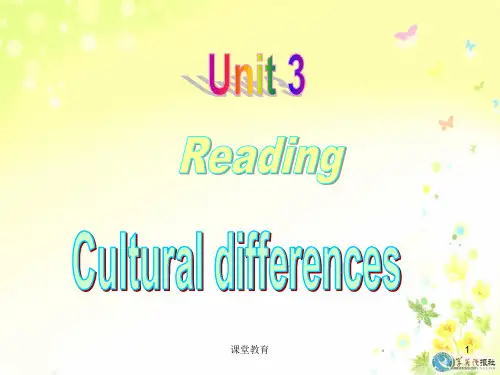
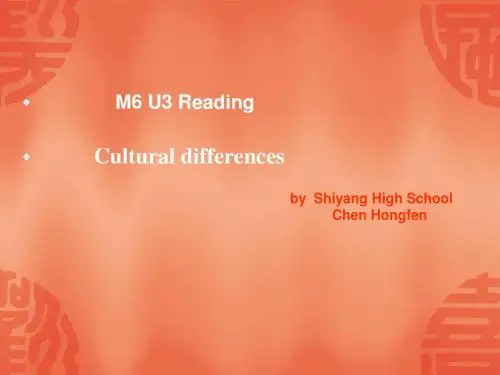
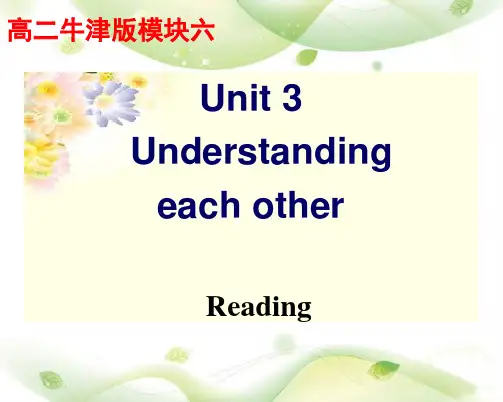
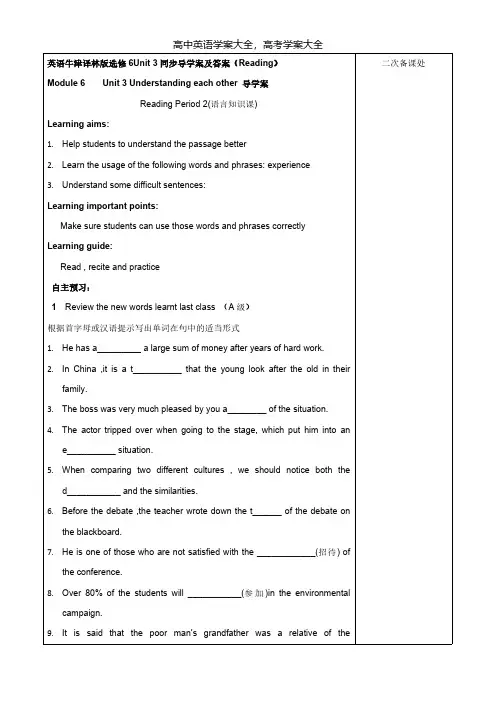
二次备课处英语牛津译林版选修6Unit 3同步导学案及答案(Reading)Module 6 Unit 3 Understanding each other 导学案Reading Period 2(语言知识课)Learning aims:1.Help students to understand the passage better2.Learn the usage of the following words and phrases: experience3.Understand some difficult sentences:Learning important points:Make sure students can use those words and phrases correctlyLearning guide:Read , recite and practice自主预习:1Review the new words learnt last class (A级)根据首字母或汉语提示写出单词在句中的适当形式1.He has a_________ a large sum of money after years of hard work.2.In China ,it is a t__________ that the young look after the old in theirfamily.3.The boss was very much pleased by you a________ of the situation.4.The actor tripped over when going to the stage, which put him into ane__________ situation.5.When comparing two different cultures , we should notice both thed___________ and the similarities.6.Before the debate ,the teacher wrote down the t______ of the debate onthe blackboard.7.He is one of those who are not satisfied with the ____________(招待) ofthe conference.8.Over 80% of the students will ___________(参加)in the environmentalcampaign.9.It is said that the poor man’s grandfather was a relative of the___________(王室的) family ,but few believe it.10.Have you ever eaten a(n) _________(火鸡)?11.I always feel nervous when talking in English with __________(本国的)English speakers.12.My grandfather never drinks ________(酒), but he smokes a lot.Try to remember the phrases(B级)2. 写出下列短语的汉语意思,并用这些短语的适当形式补全句子1. even though________2. in celebration of _____________3. in other words _____4. all the time__________________5. get used to_________6. adjust to _________________7. log off___________ 8. after all___________________a. The party was held _______________Father and Mother’s silver wedding.b. As it was very hot , she kept the air-conditioner working_____________.c. ___________ he received little education , he still managed to become the CEO of a large company.d. As a student ,you must _____________studying hard day and night.e. After he entered the dark room , it took a while for his eyes to _________the blacness.f. She had ___________before I told her anything about the meeting.g. There is no need to be mad at Johnny. ___________, he is four years old.h. They asked him to leave; ____________, he was fired.自主预习:Learning some language points.(方法引导:熟读课文并借助字典去查阅相关知识点的用法)(B级)1.experience①做动词意思为___________________②做不可数名词意思为____________________③做可数名词意思为______________________e.g. The child had never _____________ kindness.这孩子从未受过善待。
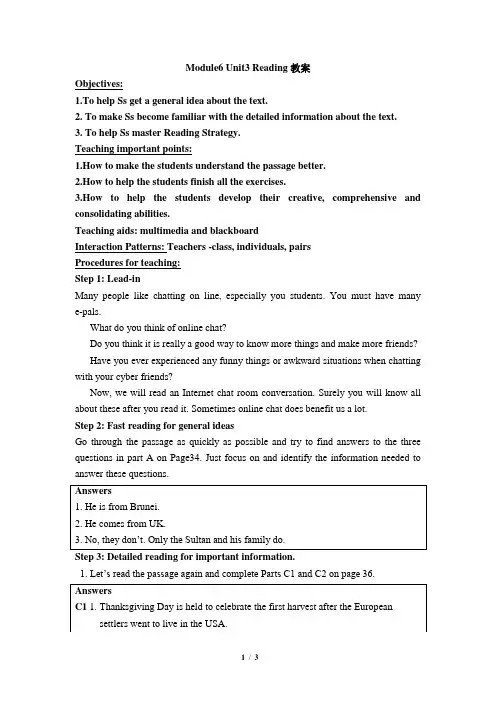
Module6 Unit3 Reading教案Objectives:1.To help Ss get a general idea about the text.2. To make Ss become familiar with the detailed information about the text.3. To help Ss master Reading Strategy.Teaching important points:1.How to make the students understand the passage better.2.How to help the students finish all the exercises.3.How to help the students develop their creative, comprehensive and consolidating abilities.Teaching aids: multimedia and blackboardInteraction Patterns: Teachers -class, individuals, pairsProcedures for teaching:Step 1: Lead-inMany people like chatting on line, especially you students. You must have many e-pals.What do you think of online chat?Do you think it is really a good way to know more things and make more friends?Have you ever experienced any funny things or awkward situations when chatting with your cyber friends?Now, we will read an Internet chat room conversation. Surely you will know all about these after you read it. Sometimes online chat does benefit us a lot.Step 2: Fast reading for general ideasGo through the passage as quickly as possible and try to find answers to the three questions in part A on Page34. Just focus on and identify the information needed to answer these questions.Step 3: Detailed reading for important information.1. Let’s read the passage again and complete Parts C1 and C2 on page 36.2. Turkey.3. In the West, the polite time to open a present is when someone gives it to a person, because they like to see the person’s reaction.4. Guests expect presents as a souvenir to remember the big day.5. Alcohol.6. In Brunel, you should use your thumb to point at things.7. In both places, you should take off your shoes before going inside a house.C2 4 7 3 1 2 6 5Step 4: Practice1. Let’s complete Part D (Re fer to the text while complete part D)AnswersD 1d 2c 3f 4g 5b 6e 7h 8a2. Now, let’s read Ma Li’s diary about her chat room discussion. Fill in blanks with correct words.E 1)traditions 2)Thanksgiving 3)harvest 4)Europe 5)celebrate6)weddings 7)embarrassing 8) presents 9)rude 10) thumbStep 5: Post-reading activities1. Now let’s make up a dialogue by using the questions in Part F on Page 37. Work in pairs for a few minutes and then present your dialogue to the whole class.2. There are also cultural differences in different English-speaking countries. For example:Americans enjoy a good sense of humour; the British take a somewhat different view and believe a formal approach is the best way; the Australians are more informal and straightforward, often enjoying a good laugh and calling their close friends or new acquaintances by their first names.1.Discussion:What might happen if people had no idea of other countries’cultures?Do you think it might result in embarrassment on inconvenience?What do you think about “culture shock”?2.Do you know more information about cultural differences?➢In most countries, nodding your head up and down means ‘yes’.➢In some parts of Greece and Turkey, however, this motion can mean ‘no’.➢In South-eas t Asia, nodding your head is a polite way of saying ‘I’ve heard you.’➢In the United Stated, when someone puts his thumb up, it means ‘Everything is all right.’ However, in Sardinia of Italy and Greece, the gesture is insulting and should not be used there.Step 6:Language PointsStep 7: Homework1. Finish Parts A1 and A2 on page116 in the workbook.2. Prepare the part Word Power.。
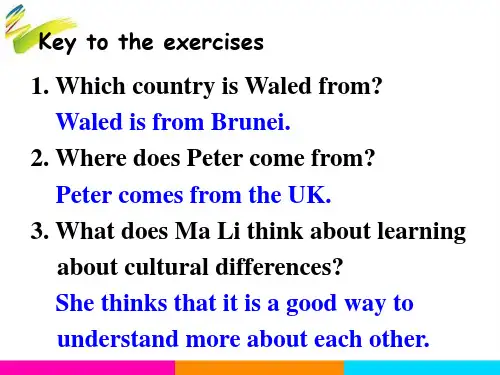
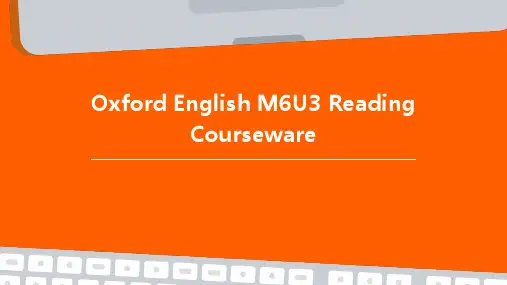
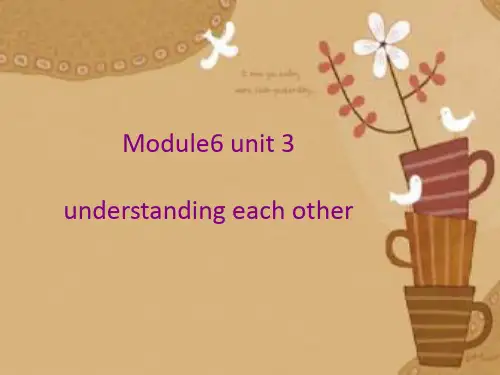
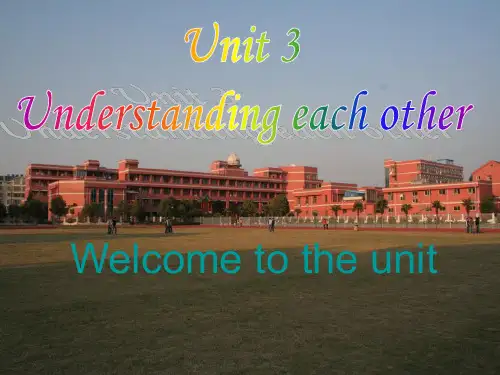
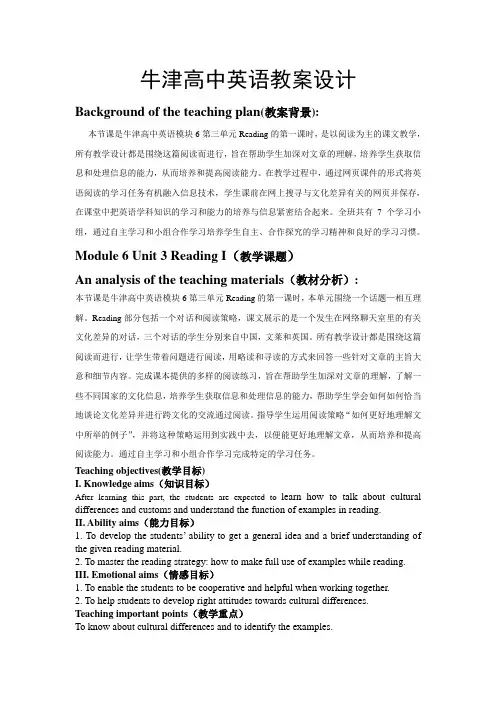
牛津高中英语教案设计Background of the teaching plan(教案背景):本节课是牛津高中英语模块6第三单元Reading的第一课时,是以阅读为主的课文教学,所有教学设计都是围绕这篇阅读而进行,旨在帮助学生加深对文章的理解,培养学生获取信息和处理信息的能力,从而培养和提高阅读能力。
在教学过程中,通过网页课件的形式将英语阅读的学习任务有机融入信息技术,学生课前在网上搜寻与文化差异有关的网页并保存,在课堂中把英语学科知识的学习和能力的培养与信息紧密结合起来。
全班共有7个学习小组,通过自主学习和小组合作学习培养学生自主、合作探究的学习精神和良好的学习习惯。
Module 6 Unit 3 Reading I(教学课题)An analysis of the teaching materials(教材分析):本节课是牛津高中英语模块6第三单元Reading的第一课时,本单元围绕一个话题—相互理解。
Reading部分包括一个对话和阅读策略,课文展示的是一个发生在网络聊天室里的有关文化差异的对话,三个对话的学生分别来自中国,文莱和英国。
所有教学设计都是围绕这篇阅读而进行,让学生带着问题进行阅读,用略读和寻读的方式来回答一些针对文章的主旨大意和细节内容。
完成课本提供的多样的阅读练习,旨在帮助学生加深对文章的理解,了解一些不同国家的文化信息,培养学生获取信息和处理信息的能力,帮助学生学会如何如何恰当地谈论文化差异并进行跨文化的交流通过阅读。
指导学生运用阅读策略“如何更好地理解文中所举的例子”,并将这种策略运用到实践中去,以便能更好地理解文章,从而培养和提高阅读能力。
通过自主学习和小组合作学习完成特定的学习任务。
Teaching objectives(教学目标)I. Knowledge aims(知识目标)After learning this part, the students are expected to learn how to talk about cultural differences and customs and understand the function of examples in reading.II. Ability aims(能力目标)1. To develop the students’ ability to get a general idea and a brief understanding of the given reading material.2. To master the reading strategy: how to make full use of examples while reading. III. Emotional aims(情感目标)1. To enable the students to be cooperative and helpful when working together.2. To help students to develop right attitudes towards cultural differences.Teaching important points(教学重点)To know about cultural differences and to identify the examples.Teaching difficult points(教学难点)To help students develop practical reading skills and master the effective reading strategy.Teaching methods(教学方法)Skimming; scanning; cooperative work; discussionTeaching procedures(教学过程)Step 1: Revision &Lead-inIn China, how do we often greet each other?要求学生列举不同的问候方式,并导入到其他不同国家的问候方式。
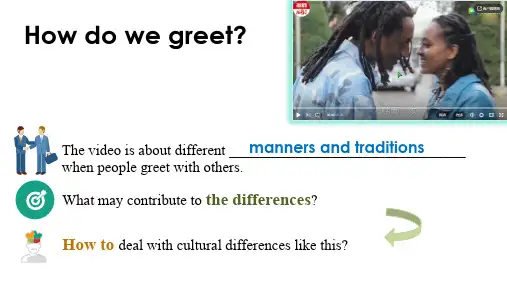
Module 6 Unit 3 Understanding each otherWelcome to the unit & Reading导学案〔两个课时〕学习目标:1. 阅读课本资料,了解一些国家不同的问候方式;2.通过图片资料以及阅读文本,进一步了解不同国家〔文莱、英国等〕在婚礼习俗、肢体语言、节日等方面的差异Part 1 Welcome to the unitStep 1 Lead-inHow do Chinese people greet each other in formal situations? Step 2 Picture-talkingDifferent ways of greeting in different countries Step 3Can you think of any other customs that are different in different parts of the world?Part A三个问题.)2. Thanksgiving)4. receiving presents )6. body language )8. wedding reception)10. taking off shoes before going inside a house Step 2 Careful readingWhat are the differences?1.2.3.4.5.6.Part 2 Reading Step 1 Fast reading1. 一轮阅读完成表层理解,完成 P342. 听录音,并选出课文提到的文化差异( )1. wedding ceremony ( ( )3. eye contact ( ( )5.food and clothes ( ( )7. festivals ( ()9. greeting(译林牛津版M6U3 导学案Module 6 Unit 3 Understanding each otherStep 3 SummaryPeople from different places or countries may be very different in some ways. Americans and Brits open a present they receive it. In Korea, people have a hen to ensuregood luck for the marriage, and a rooster to bad spirits from the wedding ceremony. When the hen lays an egg during the ceremony, everyone congratulates the new couple because it is considered very lucky. In Brunei, the men have to sit with the and thewomen the bride at wedding receptions. Food, soft drinks, tea and coffee are served, but alcohol is not. People in Brunei use their thumbs to point to avoid , so many foreigners have trouble getting to it. British people celebrate Bonfire Night on November 5th every year. People light large fires, let off outside, gather around andhas a party.When in Rome, do as the Romans do!Module 6 Unit 3 Understanding each other Word power 导学案〔一个课时〕学习目标1.了解并通过相关练习熟知英语外来词汇.2.学会一些跟动物或物品的特性有关的俗语.3.自主学习、合作探究.Part 1 Borrowed wordsStep1 Lead-inDo you know any English words borrowed from Chinese?Step 2 English borrowed from other languageI解决生词障碍〔可以参考P70〕1.geological terms3.Arabic __________________________5. ballet _____________________________7. colonel ___________________________n Read Part A & B, and fill in the blanks m学以致用,请完成P39 Part C 2. military ____________________________ 4. spice ______________________________ 6. confetti ______________________________ 8.opera _______________________________Part 2 Idioms connecting a characteristic with an animal or a thing.I Complete the sentences1.I didn ' t hear the telephone ringing. I.2.Emily never gets too excited about anything. She is always.3.Poor Richard spent his last penny on a bowl of noodles. Now he is.4.She never stops for a second. She is always.5.Don ' t worry. John will carry the box for you. He is. n More examples1.His hands are as black as coal.2.Without glasses she is as blind as a bat.3.The child is as bright as a button.4.Be careful of him. He as c unning as a fox.5.The twins are as like as two peas.6.The beautiful girl is as proud as a peacock.7.It ' s impossible to persuade him. Hes stubborn as sa mule.8.You can ' t expect her to do that. Sas timid as a mouse.in Complete the passageas white as snow as hungry as a lionas mad as a wet hen as proud as a peacockSnow WhiteLong long ago, there was a princess with skin, so people called her Snow White. Her stepmother was, but had a heart of stone. Hearing that Snow White became far more beautiful than her, she got and wanted to kill the girl.Snow White escaped from the house, and was lost in the forest. She was.Module 6 Unit 3 Understanding each otherGrammar and usage Unreal conditions导学案〔一个课时〕学习目标1.通过语篇初步了解if非真实条件句.2.通过配套练习,灵活的运用if非真实条件句.3.掌握if非真实条件句的省略与倒装.4.自主学习、合作探究,学以致用!Part 1 Lead-inAs is known to all, different countries have different cultures. If you asked whether a British man had eaten or not, he would be shocked. What interests us most is that there are sometimes great cultural differences even between native English speakers. If you were to visit Britain on November 5th, you would experience Bonfire Night, which Americans are not familiar with at all.If Ma Li had read more books about cultural differences before, she would have had no trouble with her homework.1.请大家认真阅读第40页的导读内容,并且答复:What is an unreal conditional?2.词汇expectation embarrassingemperor business consultantget into trouble let alonePart 2 Unreal conditionsI if非真实条件句在不同时态中的使用1.Unreal present tense.If you asked whether a British man had eaten or not, he would be shocked. If he were here, he Array might be able to help us.Practice:1)If I(be) a bit taller, I(reach) the box. (P40)2)If I(have) the chance, I(want) to be a business consultant. (P40)3)If God(give) me another chance, I(say) the three words to her--- I love you.2. __________________________If Ma Li had read more books about cultural differences before, she would have had no trouble with her homework.Practice 1:请用if非真实条件句改写以下句子:1)I was nervous just now, so I didn ' t score.2)I didn ' t do exercise before, so I was fat.3)I came late, so I didn ' t see Jay.Practice 2:选择正确答案1)If you the chat room ten minutes ago, you would have known what we were talking about!(P40)A.joinedB. have joinedC. had joinedD. joins2)If the man had pointed with his first finger when he was in Brunei, everyonethat he was very rude.(P40)A.will thinkB. would thinkC. will have thoughtD. would have thought3)If life so hard for me as a child, I working at such a young age.(P116 C1)A.had not been; would not have startedB. was; would not have startedC. had been; would have startedD. was not; would start3.Unreal future conditionsIf you were to visit Britain on November 5th, you would experience Bonfire Night, which Americans are not familiar with at all.If I had time tomorrow, I would certainly help you.Practice: Make up your own sentences(合作探究,2 分钟)1)If it should be the doomsday(世界末日)tomorrow, what would you do?2)What would you do, if it were to be June 6, 2021 tomorrow?If you(tell) me earlier, I(not get) into trouble.(P41)If I(be) taller, I(be) better at basketball.(P116C1).If you(take) the train, you(get) there much sooner.(P41)Practice:阅读41页的文章,用if虚拟条件句改写句子.模块六三单元Module 6 Unit3 Understanding each otherTask导学案〔一个课时〕学习目标1.输入信息:阅读一篇关于国外禁忌的文章,了解不同文化背景的传统差异.听两段P42、P43的听力练习,让学生在亲身体验中感受不同的文化,传统和禁忌.输出信息:写一封抱歉信, 解释文化上的误会.2.学习听力技巧:如何做好听力填空题3.自主学习、合作探究.Part 1 Listening and reading1.阅读42页的导入局部,并且完成:Before the listening:Read the text to and you are likely to hear.Decide if it is or.After the listening:Check and.2.听录音,补全42页内容3.What are the incidents mentioned in the article?5.Listen to Part C and get more information about cultural differences.Consolidation Taboos in India, Japan, AmericaIndia:Japan:America:Part 2 Writing a letter of apology1.How to write your letter?(P45)2.结合42、43 页所学的内容,在Mr Singh(Indian), Mr Takashi(Japanese),与Mr Hudson(American)三个人中选择一个人写一封抱歉信.模块六三单元Module 6 Unit 3 Understanding each otherProject Making a reference book导学案(一个课时)学习目标1.通过阅读文化体验之旅旅游公司旅游小册,了解四种少数民族文化---因纽特,澳大利亚土著,新西兰毛利,美洲印第安土著2.学以致用,呈现家乡传统,风俗,生活方式特色一面.Part 1 Read and get some basic information about the four minorities.Part 2 n Reading comprehension1.After reading this travel brochure, you have some ideas about.A. different minority culturesB. different ethnic traditionsC. unique customs and lifestylesD. all of the above2.Which of the following is NOT true according to the text?A.While dancing with the Inuit people, you may be invited to wear a special animal dance mask carved from wood.B.The Maori people are believed to be originally from the Pacific islands of Polynesia.C.American Indians live in wooden houses and wear clothes made from animal skins.D.Aborigines have developed a piece of wood as a tool for hunting, which is called boomerang.3.Your friend likes travelling and is interested in sleeping in tents. He is especially fond ofhunting animals with bows and arrows. Which place do you suggest he visit?A.Nunavut in Canada where the Inuit live.B.The Pacific Island of Polynesia where Maoris liveC.Kakado in Australia where Aborigines live.D.The centre of North America where the Plains Indians live.4.Which of the following can be inferred from the text?A.The Aborigines live mainly in meat and still live by gathering food.B.Gods and Spirits played and are still playing an important part in these ethnic groups ives.C.The Inuit people like to hunt food with bows and arrowsD.The Maori people like to pay their respect to Gods by singing and dancing.Part 3 Sentence imitatingSentence bank 1: to describe history and famous peopleSentence imitating:Xiangxiang the " Dragon City 〞 ,legends.Xiangxiang Chu during the Spring and Autumn period and the Warring StatesPeriod. It many famous people, such as Huang gonglue, Tanzheng, Chenggen, Xiaosan,Cai hesen and so on. Xiangxiang accent is an oldest language, which is also most difficult to understand.Sentence bank 2: to describe foodSentence bank 3: to describe beliefSentence bank 4: to describe way of lifeSentence imitating:1.湘乡的人们参加很多锻炼.2.你会看到人们爬东台山.并且在被打造成沿河风光带的滨河路上散步。
Module6 Unit3要点详解:Reading部分1. Today I would like to talk to you guys and try to accumulate some more information about cultural differences because I have to do a piece of homework on cultural differences.今天我想和伙伴们谈谈,收集一些关于文化差异方面的东西,因为要做有关文化差异方面的作业。
1) accumulate: gradually get more and more Vt. 积累,聚集Reading is a good way to accumulate our knowledge.阅读是积累知识的好办法。
We must accumulate enough evidence to ensure his guilt.我们必须收集足够的证据来确定他的罪行accumulation: n.He is experienced in the accumulation of data. 他在收集资料方面有经验2) difference: n.差异点,不同之处Could you explain to me the differences between British English and American English? 你能给我解释下英美英语的区别吗?There is not much difference in colour. 在颜色上没有多大差别。
The two vases are so alike that I can’t tell the differen ce.这两个花瓶太想像了,很难分辨Whether he comes or not will make a big difference.他来不来有很大影响。